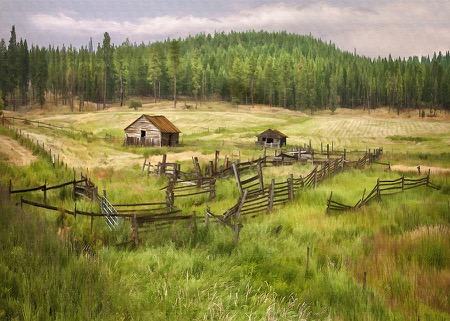Homesteadying

"Were it not for Homesteadying, my family's history would seem narrow and thin."
My family history features centuries of Homesteadying. Many of my father's ancestors were near-royalty, later sons and daughters of prefects, kings, and various mucky mucks, high born but eventually laid low by the passage of time. Their more recent descendants scraped out their livings, some too poor or unskilled to even homestead. One became a circuit rider. I know that means respectably homeless, honorably homestead-less. My mom's side of the family was involved in every homesteading scheme since 1600. Puritans, Revolutionary War soldiers, indentured slaves, on-the-lam protesters against British rule, dislocated sons, predestinationists, pro-slavery and against, a Civil War veteran, a sixteen year old bride, all relocated to hinterland with the intention of settling it. ©2019 by David A. Schmaltz - all rights reserved
They each arrived in some prior century, finding rock and hardpan greeting them. Whether the wilds of Vermont, Florida, Texas, Kentucky before it was Kentucky, Ohio, Missouri Territory, Nebraska Territory, or the verdant green of Oregon's Willamette Valley, each survived more than thrived for the first few years. My mom's great grandmother, Little Grandma, that once sixteen year old bride who crossed the Oregon Trail on horseback twice, confided that upon arrival at a fresh homestead, they planted the hop vine first, this to attract and hold the yeast that would leaven their bread. Everything else took more effort to produce any yield. My grandmother told the story of showing up late for supper one evening. Her dad was threatening to give her some stripes when she explained that she'd only been obeying the first rule of life in the Eastern Oregon scablands: kill every rattler you see. She'd had to pry up a fencepost with which to kill that snake and she'd had to reset the post so the livestock wouldn't wander. She received no spanking that night.
By the time I'd come of age, the lure of free land no longer existed. My first wife and I bought a place in a questionable neighborhood instead, an act then known as Urban Homesteading. I doubt that any of my ancestors felt any more discouraged by their initial prospects, but we managed. I think we might possess an innate ability to adapt in the ways that homesteads naturally encourage us to adapt, though success never is guaranteed. The family history tells of many more misadventures than stunning successes. That ancestor who'd survived his indenture to marry the daughter of a prominent landowner and take possession of his own section, a place he called Teague's Delight, set along the Susquehanna just south of today's Pennsylvania border. He fell into a Spring-flooded creek, cracked his head, and drowned. His widow remarried and proceeded down the Great Highway west of the Blueridge, her granddaughter to continue the adventure near Alamance in North Carolina, her offspring headed further West over the Cumberland Gap.
Little Grandma and her first husband tried Oregon, washed out over the first Winter, returned to Illinois, saved their money, then returned West to the windy weed patch southern Sandhills of Nebraska Territory, probably under the delusion that rain would follow their plow. They raised one family there before moving back to Oregon where her husband died. She remarried to a widower with eight kids to match her seven and went on to bring another couple of kids into the world before dying at ninety two, about homesteaded out by then. She'd inhabited three or four different homesteads by then, none of which actually killed her. She retired to a spit of rocky ground adjacent to the John Day River which she called Eden. Were it not for Homesteadying, my family's history would seem narrow and thin. Though none of them succeeded in founding a lasting institution, each founded a home fit for human habitation for the few years that seemed to have mattered. We abide still.


